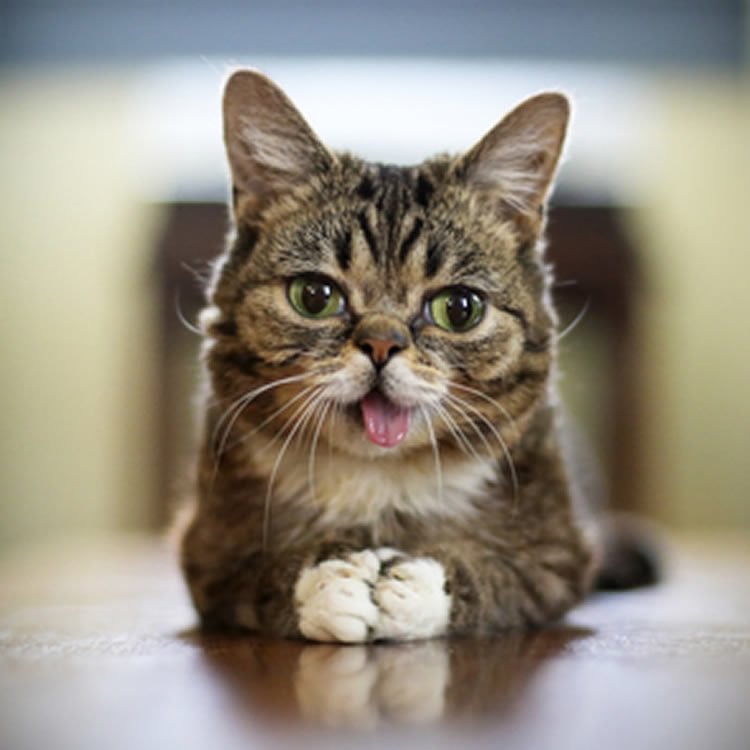Viewing cat videos boosts energy and positive emotions, IU study finds.
If you get a warm, fuzzy feeling after watching cute cat videos online, the effect may be more profound than you think.
The Internet phenomenon of watching cat videos, from Lil Bub to Grumpy Cat, does more than simply entertain; it boosts viewers’ energy and positive emotions and decreases negative feelings, according to a new study by an Indiana University Media School researcher.
The study, by assistant professor Jessica Gall Myrick, surveyed almost 7,000 people about their viewing of cat videos and how it affects their moods. It was published in the latest issue of Computers in Human Behavior. Lil Bub’s owner, Mike Bridavsky, who lives in Bloomington, helped distribute the survey via social media.
“Some people may think watching online cat videos isn’t a serious enough topic for academic research, but the fact is that it’s one of the most popular uses of the Internet today,” Myrick said. “If we want to better understand the effects the Internet may have on us as individuals and on society, then researchers can’t ignore Internet cats anymore.

“We all have watched a cat video online, but there is really little empirical work done on why so many of us do this, or what effects it might have on us,” added Myrick, who owns a pug but no cats. “As a media researcher and online cat video viewer, I felt compelled to gather some data about this pop culture phenomenon.”
Internet data show there were more than 2 million cat videos posted on YouTube in 2014, with almost 26 billion views. Cat videos had more views per video than any other category of YouTube content.
In Myrick’s study, the most popular sites for viewing cat videos were Facebook, YouTube, Buzzfeed and I Can Has Cheezburger.
Among the possible effects Myrick hoped to explore: Does viewing cat videos online have the same kind of positive impact as pet therapy? And do some viewers actually feel worse after watching cat videos because they feel guilty for putting off tasks they need to tackle?
Of the participants in the study, about 36 percent described themselves as a “cat person,” while about 60 percent said they liked both cats and dogs.
Participants in Myrick’s study reported:
- They were more energetic and felt more positive after watching cat-related online media than before.
- They had fewer negative emotions, such as anxiety, annoyance and sadness, after watching cat-related online media than before.
- They often view Internet cats at work or during studying.
- The pleasure they got from watching cat videos outweighed any guilt they felt about procrastinating.
- Cat owners and people with certain personality traits, such as agreeableness and shyness, were more likely to watch cat videos.
- About 25 percent of the cat videos they watched were ones they sought out; the rest were ones they happened upon.
- They were familiar with many so-called “celebrity cats,” such as Nala Cat and Henri, Le Chat Noir.
Overall, the response to watching cat videos was largely positive.
“Even if they are watching cat videos on YouTube to procrastinate or while they should be working, the emotional pay-off may actually help people take on tough tasks afterward,” Myrick said.
The results also suggest that future work could explore how online cat videos might be used as a form of low-cost pet therapy, she said.
For each participant who took the survey, Myrick donated 10 cents to Lil Bub’s foundation, raising almost $700. The foundation, Lil Bub’s Big Fund for the ASPCA, has raised more than $100,000 for needy animals.
Source: George Vlahakis – University of Indiana
Image Credit: The image is credited to Mike Bridavsky/www.lilbub.com
Video Source: The video is available at the Real Grumpy Cat YouTube page
Original Research: Abstract for “Emotion regulation, procrastination, and watching cat videos online: Who watches Internet cats, why, and to what effect?” by Jessica Gall Myrick in Computers in Human Behavior. Published online June 12 2015 doi:10.1016/j.chb.2015.06.001
Abstract
Emotion regulation, procrastination, and watching cat videos online: Who watches Internet cats, why, and to what effect?
Anecdotes abound about the frequent use of the Internet to view cat-related media. Yet, research has yet to seriously address this popular culture phenomenon rooted largely in social media platforms. It is possible that viewing of online cat media improves mood, but this activity may also foster negative outcomes linked to using the Internet for procrastination. The present survey of Internet users (N = 6795) explored the correlates of viewing “Internet cats,” motivations for consuming this media, and its potential effects on users. It also tested a conceptual model predicting enjoyment as a function of the relationships between procrastination, guilt, and happiness. Results reveal significant relationships between viewing and personality types and demonstrate conceptual nuances related to the emotional benefits of watching Internet cats.
“Emotion regulation, procrastination, and watching cat videos online: Who watches Internet cats, why, and to what effect?” by Jessica Gall Myrick in Computers in Human Behavior. Published online June 12 2015 doi:10.1016/j.chb.2015.06.001






